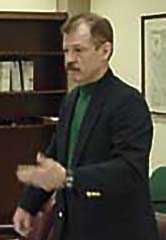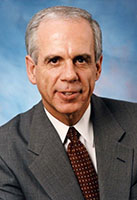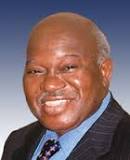Moments in Disability History 28
The Original: Americans with Disabilities Act of 1988
In her book, "The Disability Pendulum: The First Decade of the Americans with Disabilities Act," Ruth Colker presents the first legislative history of the Americans with Disabilities Act (ADA). Colker reports that the first draft of the ADA was the culmination of two important President-appointed commissions: the National Council on the Handicapped (now the National Council on Disability) (National Council) and the Commission on the Human Immunodeficiency Virus Epidemic (HIV Commission).
The HIV Commission found that civil rights legislation was needed to prevent disability discrimination and that such legislation should cover HIV-related discrimination. The importance of protecting people with HIV is found in every major report and speech surrounding passage of the ADA, beginning in 1988.

Ruth Colker
The National Council issued two reports. Included in the report, Toward Independence (1986), the Council developed a draft of a comprehensive equal opportunity proposal entitled "The Americans with Disabilities Act of 1988." The draft was prepared by the National Council's attorney and research specialist Robert L. Burgdorf, Jr.
Learn more about Robert Burgdorf
The National Council believed that this draft represented a significant step toward the introduction and eventual passage of such a statute. The National Council was also confident that the "Americans with Disabilities Act" represented the need for expanded nondiscrimination protections and convinced that enactment of such a statute was key to increased independence for persons with disabilities. The second report, On The Threshold of Independence, included a draft bill and summary.

Robert L. Burgdorf, Jr.
In 1988, National Council members persuaded Senator Lowell Weicker, a liberal Republican Senator from Connecticut, the home state of another National Council member, Sandra Parrino, to introduce the Americans with Disabilities Act.
Recognizing that any hope of passage depended upon securing Democratic sponsors, Weicker suggested that advocates also approach Tom Harkin, a liberal Democrat from Iowa with definite presidential aspirations, to serve as a co-sponsor. Both Weicker and Harkin had personal reasons to be sympathetic to the legislation. Weicker was the father of a child with Down syndrome; Harkin's brother was deaf.
Senator Weicker introduced S. 2345 in the Senate on April 28, 1988, stating that discrimination based on handicap was "just as intolerable as other types of discrimination that our civil rights forbid." Thirteen Senators signed on as co-sponsors and, before the end of the legislative session, S. 2345 had twenty-seven other additional co-sponsors.

Senator Lowell Weicker
In the House, Representative Tony Coelho from California introduced H.R. 4498, on April 29, 1988. Coelho, himself, was a victim of discrimination because of his epilepsy. Forty-seven co-sponsors agreed to sign on in the House and, before the end of the legislative session, the number of co-sponsors grew to 125.
The text of the ADA was identical in both the Senate and House. Joe Shapiro, in his book, No Pity, reports that the legislation was "a radical 'flat earth' bill." Within 2 years, everything would have to be accessible and people with disabilities would have been allowed to sue for punitive damages if they faced discrimination from business.
(No Pity is the subject of Moments in Disability History 25, a part of the ADA Legacy Project.)
Senator Weicker spoke in favor of the legislation on April 28, 1988 and Representative Silvio Conte of Massachusetts spoke in favor the legislation on the next day, on April 29, 1988. However, both inaccurately claimed the definitions in the bill, including the definition of disability that drew on definitions already contained in Section 504 of the Rehabilitation Act of 1973.

Representative Tony Coelho
The bill was divided into the following six sections that were stronger than those contained in the bill that was ultimately enacted in 1990 as the Americans with Disabilities Act:
- Section 4 – prohibited discrimination in employment, housing, public accommodations, transportation or telecommunications;
- Section 5 – prohibited discrimination in access to services or programs;
- Section 6 – prohibited discrimination in housing;
- Section 7 – provided limitations on the duties of accommodation and barrier removal;
- Section 8 – required various entities to promulgate regulations to enforce the ADA; and
- Section 9 – provided rules with respect to enforcement.
Senator Robert Dole of Kansas, a sponsor, spoke in favor of the need for such a bill but with reservations:
"I have reservations about many aspects of this bill including the elimination of the undue hardship criteria for reasonable accommodation, clarification on what constitutes a public accommodation and what such public accommodation would be required to do under the retrofitting provisions of this bill, what do we mean by transportation services, and what is the scope of this bill to intrastate transportation systems."
Senators John McCain of Arizona and Donald Riegel, Jr., of Michigan also spoke in favor of the bill but expressed similar reservations. Senator Riegel's concerns were regarding expenses to businesses and local government.

Senator Robert Dole
On June 6, 1988, Senator Weicker tied passage of the ADA to recommendations of the Presidential Commission on HIV, thereby linking the ADA as a response to the Acquired Immune Deficiency Syndrome (AIDS) crisis."
In her book, Colker reported that enactment of the ADA may be credited, in part, to a disparaging remark made by President Regan about candidate Michael Dukakis who was rumored to have a mental illness. On the floor of the House, Representative Tony Coelho of California expressed exception to the remark. Shortly thereafter, on August 11, 1988, presidential candidate George H. W. Bush gave his support to the ADA."
Representative Major Owens of New York summed up the future passage of the ADA in his supporting comments. He stated that both parties "are in agreement on at least one major item on our agenda for future legislation. While the Democratic convention will endorse this piece of legislation, both candidates are on record for having endorsed it also".
During the congressional hearings of the 100th Congress, the unanimous sentiment among the witnesses was that people with disabilities struggled with unequal opportunities. They confronted not only the challenges of their disabilities, but also the physical barriers that society erects.
Review the September 27, 1988 Joint House and Senate Hearings on the ADA.

Representative Major Owens
Despite these testimonials, Joe Shapiro stated in his book, No Pity, that "this version of the ADA was a bust. The bill was introduced in the closing days of the 100th Congress to almost universal disregard. Legislators, on their way home for reelection races, ignored it. Ronald Reagan… apparently did not even know of its existence. The press and the public ignored it."
By the time the legislation was introduced in April, the presidential campaign was well underway. The initial consideration of the ADA in the summer and fall of 1988 was cut short by the Presidential campaign.

Joe Shapiro
Sources:
Colker, Ruth. The Disability Pendulum: The First Decade of the Americans with Disabilities Act. New York: New York University Press, 2005.
Ruth Colker: https://moritzlaw.osu.edu/ruth-colker/
Shapiro, Joseph, P., No Pity: People with Disabilities Forging a New Civil Rights Movement, (1993), Times Books, Random House, New York and Canada, pages 113-114.
Colker, Ruth, "The ADA's Journey Through Congress", 39 Wake Forest Law Review 1, Spring 2004.





